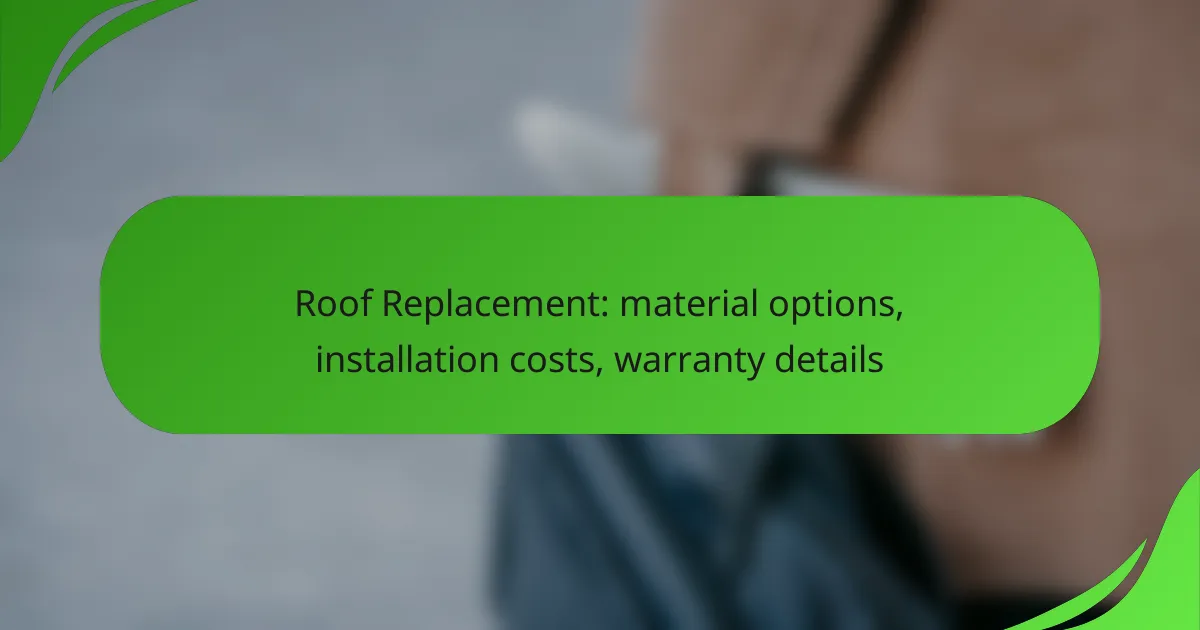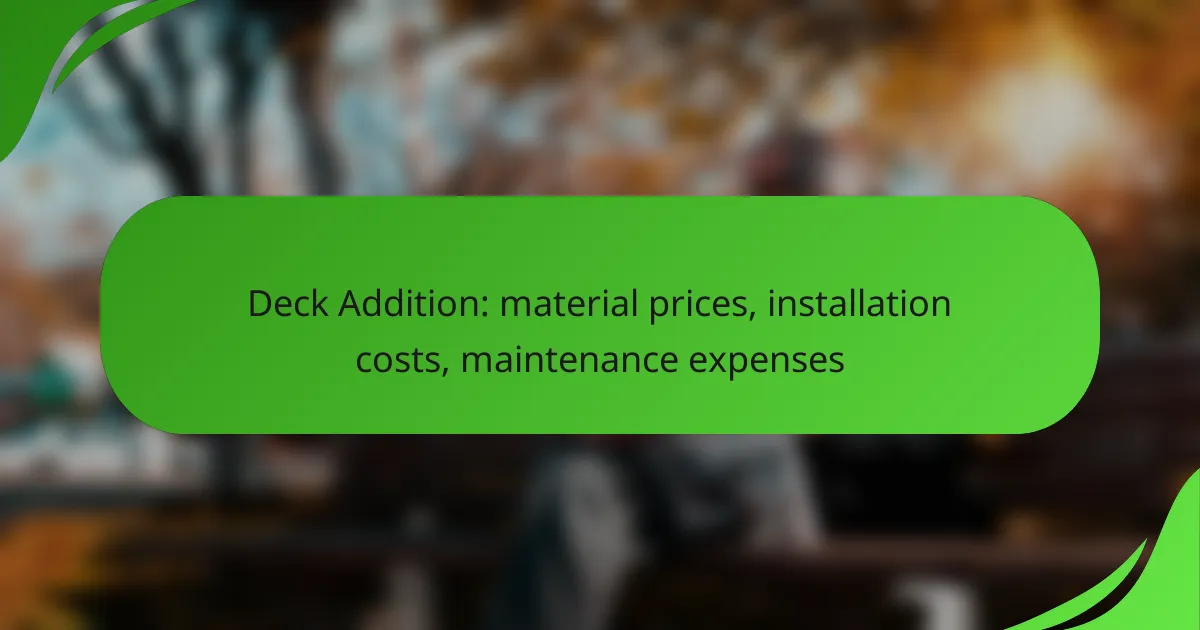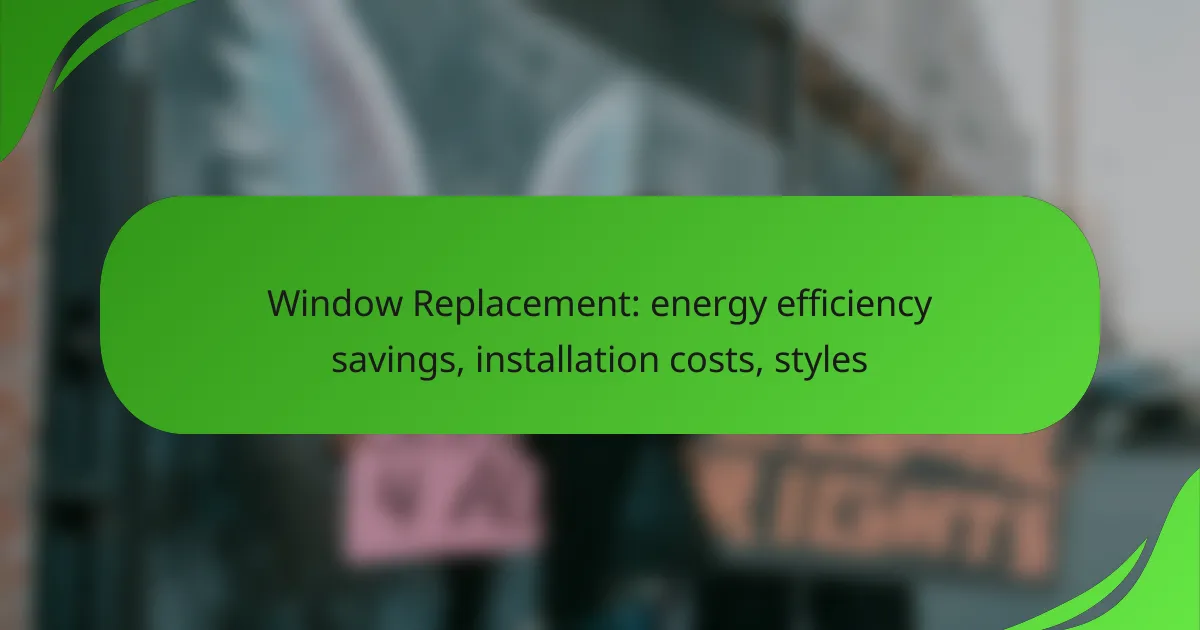When considering a roof replacement, it’s essential to evaluate various material options based on durability, cost, and aesthetic appeal. Installation costs in the US generally range from $5,000 to $15,000, influenced by factors like material choice and roof size. Additionally, understanding the warranties associated with different roofing materials can provide valuable protection against defects and help ensure a sound investment.
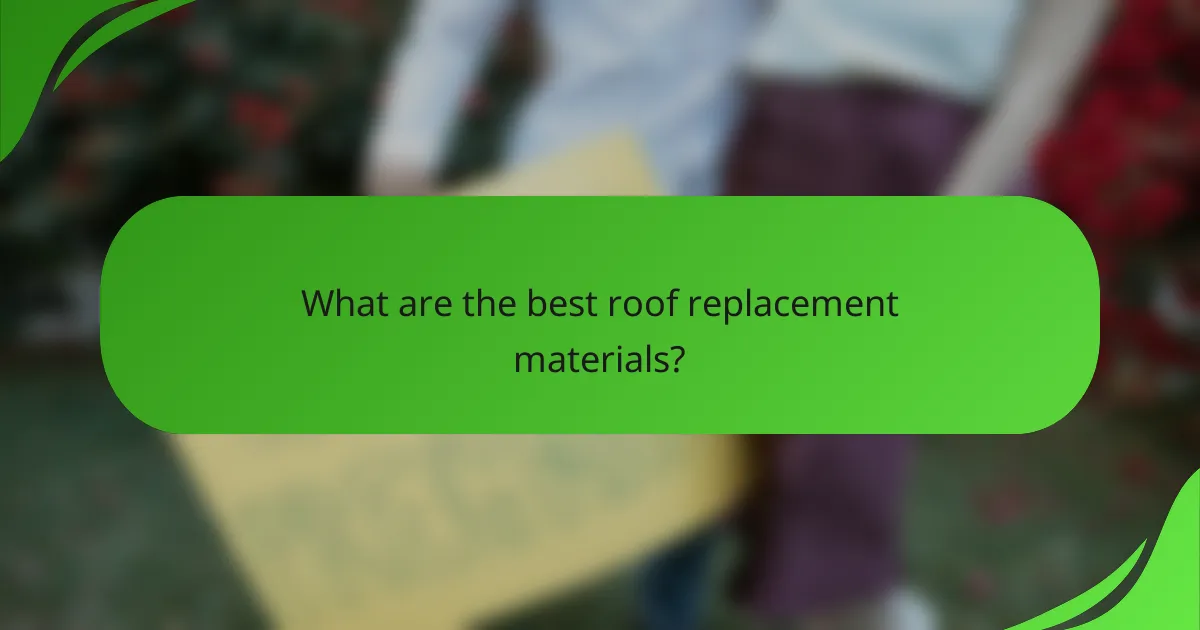
What are the best roof replacement materials?
The best roof replacement materials vary based on durability, cost, and aesthetic appeal. Homeowners should consider their budget, local climate, and desired lifespan of the roof when selecting materials.
Asphalt shingles
Asphalt shingles are one of the most popular roofing materials due to their affordability and ease of installation. They typically cost between $90 and $100 per square (100 square feet) and can last around 20 to 30 years with proper maintenance.
These shingles come in various colors and styles, allowing for customization to match the home’s exterior. However, they may not perform as well in extreme weather conditions compared to other materials.
Metal roofing
Metal roofing is known for its longevity and durability, often lasting 40 to 70 years. The cost ranges from $300 to $900 per square, depending on the type of metal used, such as aluminum, steel, or copper.
This material reflects heat, which can help reduce cooling costs in warmer climates. However, installation can be more complex, requiring skilled labor to prevent issues like leaks.
Tile roofing
Tile roofing, made from clay or concrete, offers a distinctive look and exceptional durability, often lasting over 50 years. The cost typically ranges from $300 to $600 per square, making it a more expensive option.
Tile roofs are highly resistant to fire and can withstand harsh weather conditions. However, they are heavy, requiring a strong underlying structure to support the weight.
Wood shakes
Wood shakes provide a natural aesthetic and can last around 30 years if properly maintained. The cost usually falls between $250 and $600 per square, depending on the type of wood used.
These roofs are energy-efficient and offer good insulation. However, they require regular maintenance to prevent rot and insect damage, and they may not be suitable in areas prone to wildfires.
Slate roofing
Slate roofing is one of the most durable options available, with a lifespan exceeding 100 years. The cost is significantly higher, typically ranging from $600 to $1,500 per square, reflecting its premium quality.
Slate is fire-resistant and can withstand severe weather conditions. However, its weight necessitates a reinforced roof structure, and installation requires specialized skills, making it a less common choice for many homeowners.
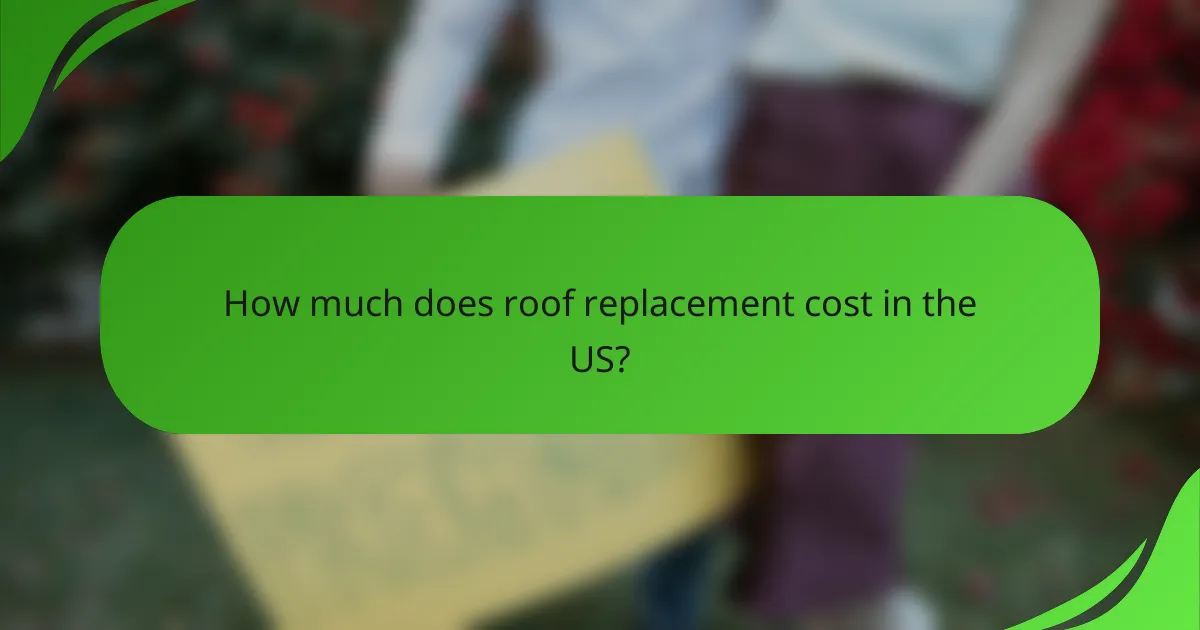
How much does roof replacement cost in the US?
The cost of roof replacement in the US typically ranges from $5,000 to $15,000, depending on various factors such as material choice, roof size, and labor costs. Homeowners should budget for both the materials and installation when planning for a roof replacement.
Average cost per square foot
The average cost for roof replacement per square foot generally falls between $3 and $7. This price can vary based on the type of roofing material chosen, with asphalt shingles being on the lower end and metal or tile roofs on the higher end.
For example, if you have a 2,000 square foot roof, you might expect to pay between $6,000 and $14,000 for the entire project, depending on the material and complexity of the installation.
Factors affecting costs
Other factors include the geographical location, as labor rates and material costs can vary significantly from one area to another. Seasonal demand can also affect pricing, with higher costs often seen during peak roofing seasons.
Regional cost variations

What warranties are available for roof replacements?
Roof replacements typically come with various warranties that protect homeowners from defects in materials and workmanship. Understanding these warranties can help you make informed decisions about your roofing investment.
Manufacturer warranties
Manufacturer warranties cover defects in roofing materials and usually last between 20 to 50 years, depending on the type of material. Common materials like asphalt shingles, metal, and tile each have specific warranty terms that can vary significantly.
It’s essential to read the fine print, as many manufacturer warranties require proper installation by certified contractors to remain valid. Additionally, some warranties may only cover the cost of materials, leaving labor costs to the homeowner.
Workmanship warranties
Workmanship warranties are provided by roofing contractors and typically last from 1 to 10 years. These warranties cover issues arising from improper installation, which can lead to leaks or other problems.
When choosing a contractor, inquire about their workmanship warranty and ensure it is documented in your contract. A longer warranty period can indicate the contractor’s confidence in their work quality.
Transferable warranties
Transferable warranties allow homeowners to transfer the warranty to a new owner if they sell their home, which can enhance the property’s value. Not all warranties are transferable, so it’s crucial to verify this feature before making a decision.
Check the terms of both manufacturer and workmanship warranties to see if they offer transferability and under what conditions. This can be a significant selling point if you plan to move in the future.
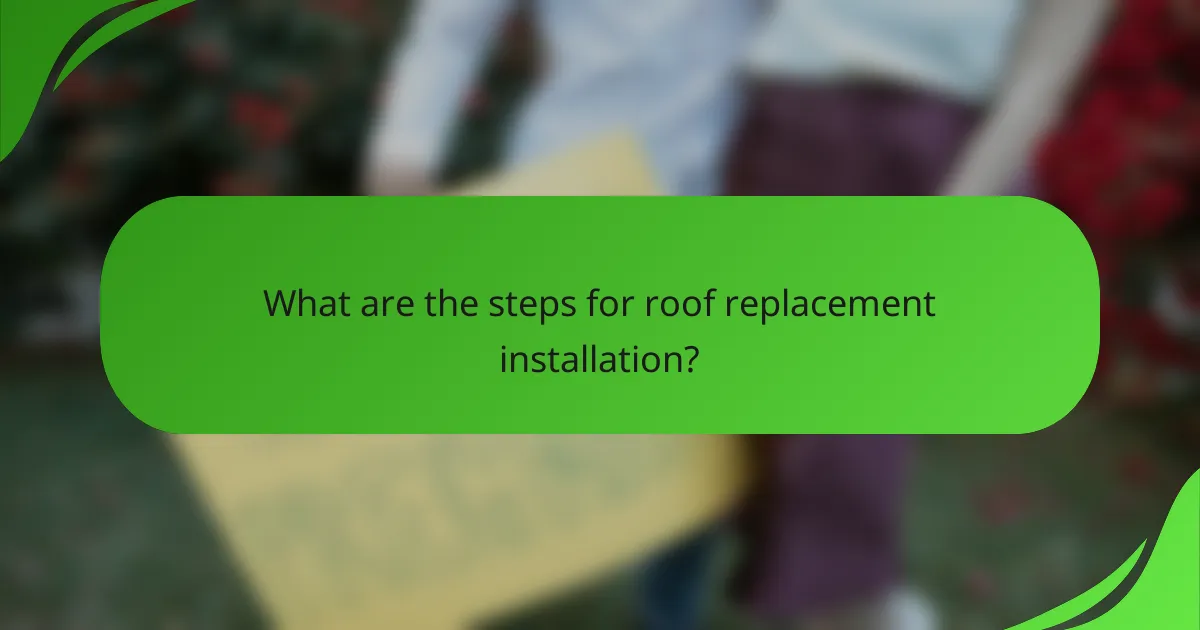
What are the steps for roof replacement installation?
Roof replacement involves a series of critical steps to ensure a successful installation. These steps include an initial inspection, selecting the right materials, removing the old roofing, and executing the installation process effectively.
Initial inspection
The initial inspection is crucial for assessing the current condition of your roof and determining the extent of the replacement needed. A professional will check for structural damage, leaks, and the overall integrity of the roof deck.
During this phase, it’s important to document any issues found, as this information will guide decisions on materials and installation methods. Homeowners should consider scheduling this inspection after severe weather events to catch potential problems early.
Material selection
Choosing the right roofing material is essential for durability and aesthetics. Common options include asphalt shingles, metal roofing, tile, and slate, each with varying costs and lifespans.
Consider factors such as climate, local building codes, and your budget when selecting materials. For instance, asphalt shingles are often the most affordable option, while metal roofing may offer better longevity but at a higher initial cost.
Removal of old roofing
Removing the old roofing is a critical step that involves stripping away the existing materials to expose the roof deck. This process can take several hours to a few days, depending on the size of the roof and the type of materials being removed.
During this phase, it’s important to check for any underlying damage to the roof deck that may need repair before new materials are installed. Proper disposal of old materials is also necessary to comply with local regulations.
Installation process
The installation process begins once the old roofing has been removed and any necessary repairs made. New underlayment is typically installed first, followed by the chosen roofing material.
Ensure that the installation follows manufacturer guidelines and local building codes to maximize the roof’s lifespan and warranty coverage. It’s advisable to hire experienced professionals to avoid common pitfalls, such as improper sealing or inadequate ventilation.
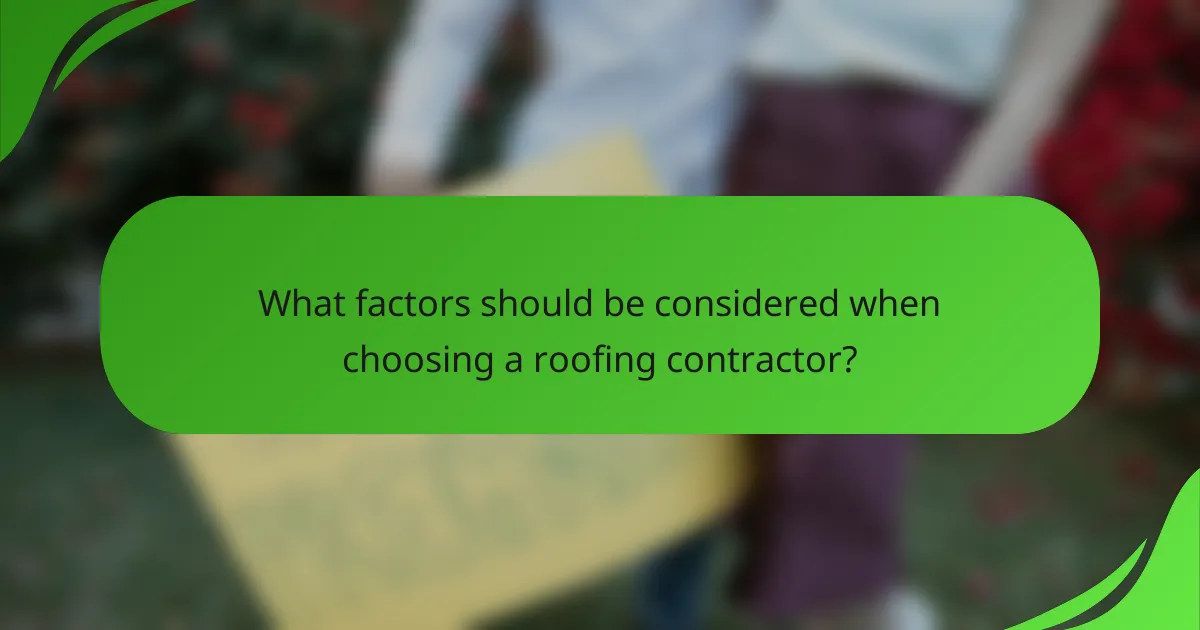
What factors should be considered when choosing a roofing contractor?
When selecting a roofing contractor, consider their experience, reputation, and licensing. A qualified contractor should have a proven track record, positive customer reviews, and the necessary permits to operate in your area.
Experience and expertise
Experience is crucial when choosing a roofing contractor. Look for a contractor with several years in the industry, as they are more likely to handle unexpected challenges effectively. Ask about their expertise with the specific roofing materials you plan to use, as different materials require different installation techniques.
Licensing and insurance
Ensure the contractor is properly licensed and insured. A valid license indicates compliance with local regulations, while insurance protects you from liability in case of accidents during the project. Request to see copies of their license and insurance certificates before hiring.
References and reviews
Check references and online reviews to gauge the contractor’s reputation. Speak with previous clients about their experiences, focusing on the quality of work, timeliness, and communication. Websites like Yelp or Angie’s List can provide insights into customer satisfaction.
Written estimates and contracts
Obtain written estimates from multiple contractors to compare costs and services. A detailed estimate should include labor, materials, and any additional fees. Once you choose a contractor, ensure you have a signed contract outlining the scope of work, payment terms, and warranty information to protect both parties.





